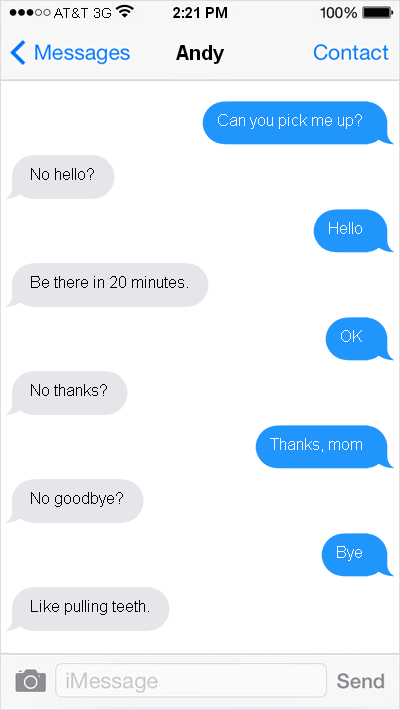Dear Dr. Packer,
I have a question about textiquette and would appreciate your input. Personally, I don't like receiving emails with no greeting (e.g., "Hi Erica") and/or no closure (e.g., "warmly, Mo"). It makes me feel like the sender regards me as a robot or automated response center. The people who send them feel it is justified since composing on a smartphone is tedious, and they are counting key strokes. My position is deficient technology does not justify deficient manners, but I seem to be in the minority on this. Could you be so kind as to weigh in on this one?
Sincerely,
Erica B.
Dear Erica,
When two human beings engage in a social exchange, it is customary and polite to inaugurate the encounter with a greeting, and conclude it with a farewell. Depending on the nature of the exchange and the ages and relationship of the individuals, these can take many forms: hi, hello, hey, and yo; “Nice to see you”; “How are you?” “Enchantée”; waving, hugging, bowing, kissing, hand-shaking; “Dear Jane”; “Hi Becky!” “Fondly”; XOXOXO.
We don’t accost strangers with “What time is it?” or “Can you change a dollar?” We initiate the conversation by saying, “Excuse me, sir,” or “I beg your pardon.” Similarly, one should never send an email or text to someone one doesn't know or communicates with infrequently without including a greeting and closing.
The essential ingredient here is an acknowledgement of the connecting of two human beings. It makes no difference whether the connection is written, verbal, or digital; whether it occurs by running into a friend on the sidewalk, writing a letter, making a phone call, or sending an email or text.
The apologists for omitting salutations and closings from electronic communications argue that the communiqué itself has an implied greeting (the “To”), and implied closing (the “From”). These minimalists rationalize that emails and text messages are like memos; that a phone number or email address somehow fulfills the protocol of acknowledging the humanity of another person when launching into, and concluding, a communication.
Well, I’m sorry. Seeing my own email address in a box saying “To” at the top of a communication doesn’t make me feel warmly or respectfully greeted. I much prefer “Dear Alex”; “Kind Sir”; “Sweetheart”; or “Hi, Gorgeous!” Then we can get down to the business of your communication.
That said, good manners allow for variation and improvisation based on context and nuance. Accordingly, here are certain exceptions to the basic rule:
The ongoing conversation. Once an email or text conversation goes beyond the first complete exchange between the two parties, it is not necessary to continue with salutations and farewells. This is analogous to an in-person conversation where, after initial mutual expressions of warmth, respect, and/or delight, the back and forth continues unfettered. As with a live conversation, once the exchange has concluded, new greetings and closings should be extended when the parties next resume contact.
The ongoing relationship. When two people—spouses, partners, best friends—are in a close relationship, there is constant emotional or spiritual connection that transcends proximity. I would rule favorably if asked to permit continuing communications between close friends and intimate partners without the protocol of greetings and closings. For example, if a husband texts his wife—How’d the meeting go?—it is self-evident that the question, in and of itself, is an expression of interest, empathy, concern, and/or affection. It is unnecessary to type “Dearest Jane” and “Love, Bill,” although the message may contain pet names, emoji, and code words that create the emotional linkage that might, in more formal communications, result from a greeting and closing.
Work communications. Work environments come with their own protocols for electronic communications, and it is wise and reasonable to follow them. There are so many subsets of functions and relationships in a place of work—supervisor/employee; partners; co-workers who are friends; people with whom you have infrequent contact (e.g., tech support, human resources)—that it is difficult to anticipate and set rules for every encounter. But, in general, coworkers in constant electronic communication should be able to drop greetings and closings without offending anyone. Colleagues, or bosses and staff may consider the start of each work day as the resumption of the previous day’s conversation, therefore allowing them to dispense with “the niceties."
Still... why are so many people looking for etiquette loopholes that allow them to kiss "the niceties" goodbye? The essence of good manners is making others feel comfortable, respected, and appreciated. And if a "Dear Juan" or "Warm regards" or "Hope you had a nice weekend" can add to the planet's Kindness Quotient, why wouldn't we all want to do that? Is it really that much effort to type "Hi" or "Best"? Is our time really that precious that we can't take 1.94 seconds (1.31 if you're really handy with your thumbs), to "err" on the side of politeness?

